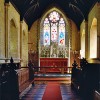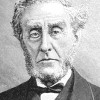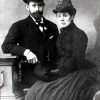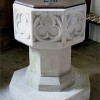A report in the Dorset County Chronicle of 8th November 1860 comments “Just as the legislature appears determined to suppress the commemoration of ‘The Gunpowder Plot’ the custom has revived in spirit so far as Dorchester is concerned.”
Under the dateline “The Fifth of November” readers were told that “not for some time have the streets of Dorchester witnessed such scenes” squibs and crackers flying about in all directions, and several large tar-barrels and fireballs being rolled along amidst crowds of small boys and “children of larger growth.”
The main event, however, was a torchlight procession, in the midst of which a large effigy of the Pope was borne along, suspended from a gallows. The scene reminded the Chronicle’s reporter of Carnival: people dressed in a variety of “outlandish” costumes including representations of Victor Emmanuel and Garibaldi escorting a youth in women’s attire as “Young Italy,” at the head of the procession.
The large crowd paraded along High West Street and South Street during which the liberator of Italy was loudly cheered. Then onto the Maumbury Rings where the effigy was burnt surrounded by the revellers whose faces were eerily lit by the light of the torches and all the while squibs were being thrown about.
“Young Italy” was borne triumphantly back into the town “the streets of which resumed their ordinary quiet aspect after the assemblage had exhausted their store of fireworks.”
Around the 19th December 1860 the weather turned: promising Dorset a white Christmas, heralded by a severe frost. ‘The Chronicle’ reported that a gentleman had written to ‘The Times’ telling that the temperature in his garden had reached 8 degrees below freezing.
The cold spell ended over the New Year. “There was a heavy fall of rain and the snow, which had covered the ground to a depth of several inches, disappeared on Sunday with a rapidity that was truly astonishing and must have caused considerable inconvenience by flooding the land in various localities.”
At Wool the pressure of water was so great it damaged a culvert near the railway station making the line dangerous to trains. A telegraph message was sent to Dorchester and a “body of men were set to work so as to temporarily make the line good.” The newspaper’s report continued “W.Meare, Esq., the able superintendent, made arrangements for engines to meet at the spot, so that the traffic was conducted with only a short delay, and the trains were able to run as usual on Monday.”
At Bridport a building that was being erected was blown down. The building some 400-feet in length had been constructed to a height of two storeys and roofed, but the “ends were open and thus the wind found play and the place was rendered a complete wreck.”
The unusually severe weather brought plenty of wild fowl into the extensive waters between Wareham and Poole and many fell to the guns of the locals living along the shore.
The weather did not stop those more fortunate from providing some Christmas cheer for their poorer neighbours. On Christmas Day all the inmates of the Dorchester Union workhouse had roast beef, plum pudding, with beer and tobacco for the men. A round of festivities continued ’till New Years day.
Mrs. Herbert Williams of Stinsford who was of the habit of having the children from the Dorchester Union house visit her residence at Stinsford for a feast had instead to take liberal amounts of plum pudding, sweet cakes and tea to the workhouse.
The old folk of the union house were entertained to dinner by the Rev. T. R. Maskew where they “thoroughly enjoyed themselves over plenty of roast beef and plum pudding with plenty of other delicacies.” The following day it was the turn of Captain and Mrs. Kindersley, of Syward Lodge who treated all the inmates with cakes, the women with tea and sugar, the men with tobacco and a variety of toys for the children. On the Monday after Christmas the Misses Campbell gave the children cakes and toys and the women tea and cake.
On New Years day Dorchester’s mayor J. F. Hodges Esq., provided a substantial dinner and tea for the workhouse inmates. He granted the women a store of tea and the men a quantity of tobacco. He also gave to the residents of the Almshouses tea, sugar and a quantity of beef, “with which to enjoy themselves at this festive season.” The Chronicle commented “The care shown by Mr Hodges for the poor, and his solicitude for their comfort and welfare, are most praiseworthy…”
Elsewhere around the county there were similar acts of kindness. At Gussage All Saints the better off parishioners, at their own expense, provided for the carriage from Poole of coal for the poor. The coal paid for by The Earl of Shaftesbury and The Provost and Fellows of Queen’s College, Oxford.
On Christmas Eve, Colonel Lutterell, “the proprietor of the valuable and much admired Wootton Manor” gave to the deserving poor of the parish of Wootton Fitzpaine, a large quantity of good beef.
At Wimborne Minster a Special Offertory was given on Christmas Day for distribution amongst the poor. At Charmouth after Christmas a large quantity of bread was given to the poor families of the parish and this was made possible by means of a bequest by the late John Bullen Esq. Good warm clothing was distributed to the poor by the charity of the late Mrs Marker.
A “notorious” poacher named Dicker who lived at Milborne St. Andrew was arrested and taken before magistrates at Blandford charged with shooting at one of the county police while in the execution of his duty.



